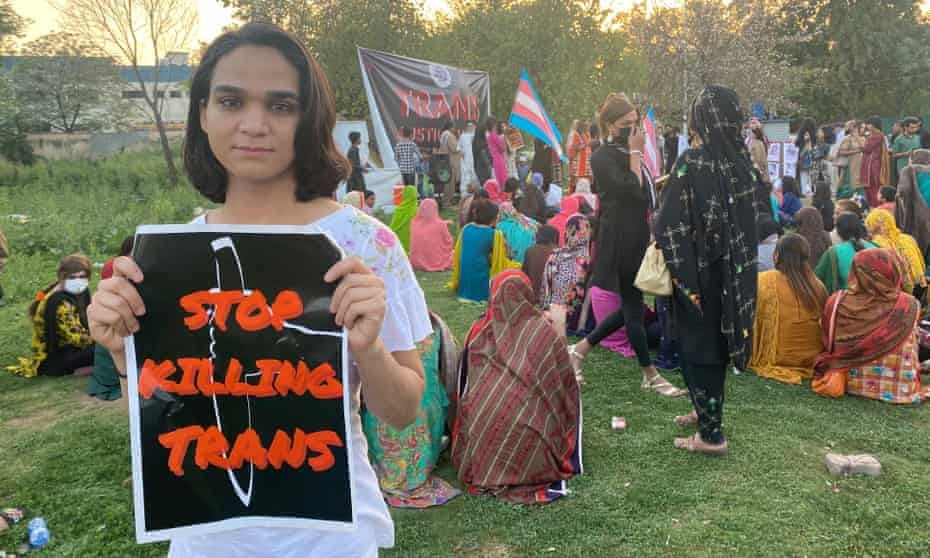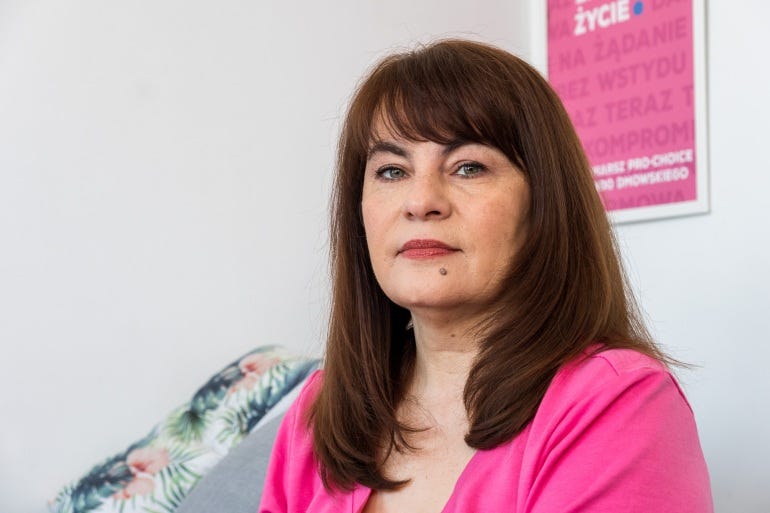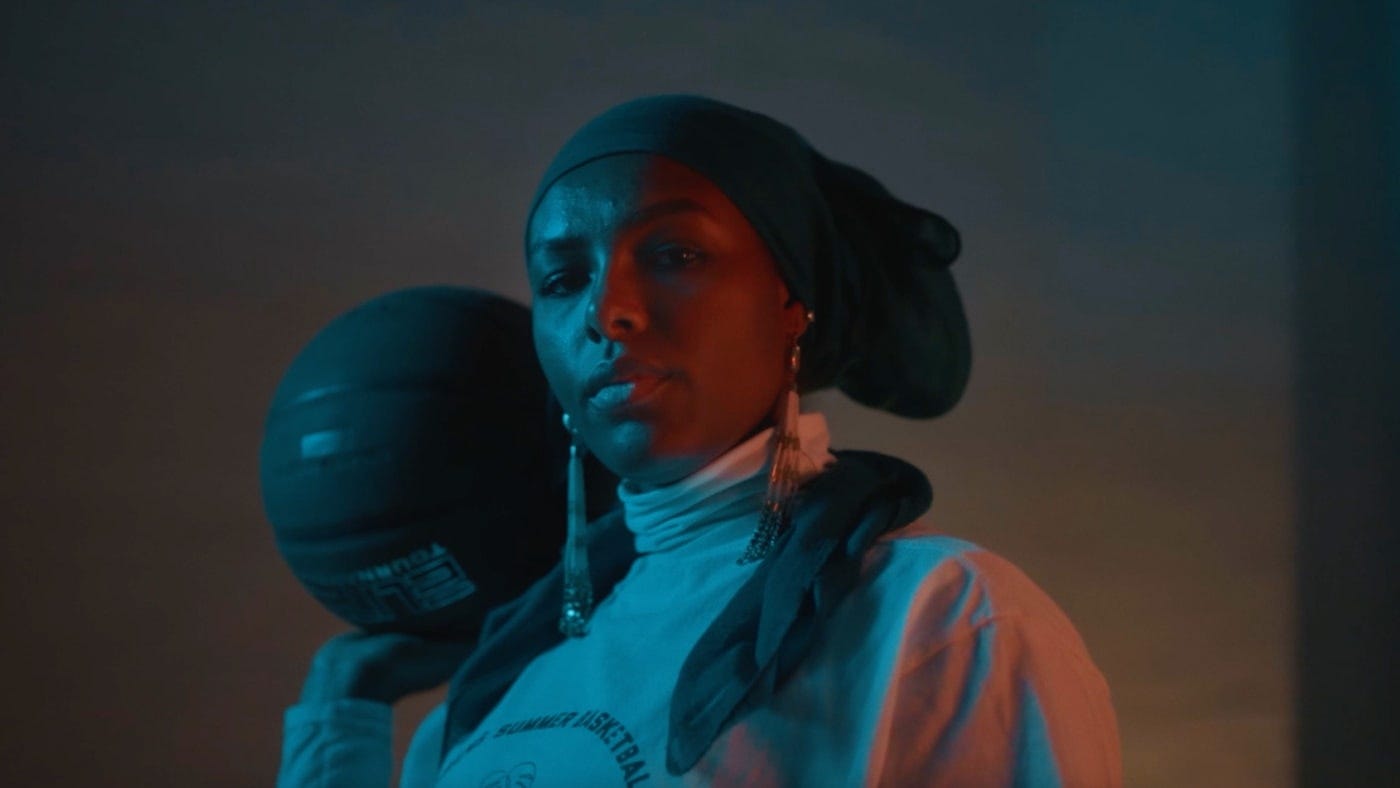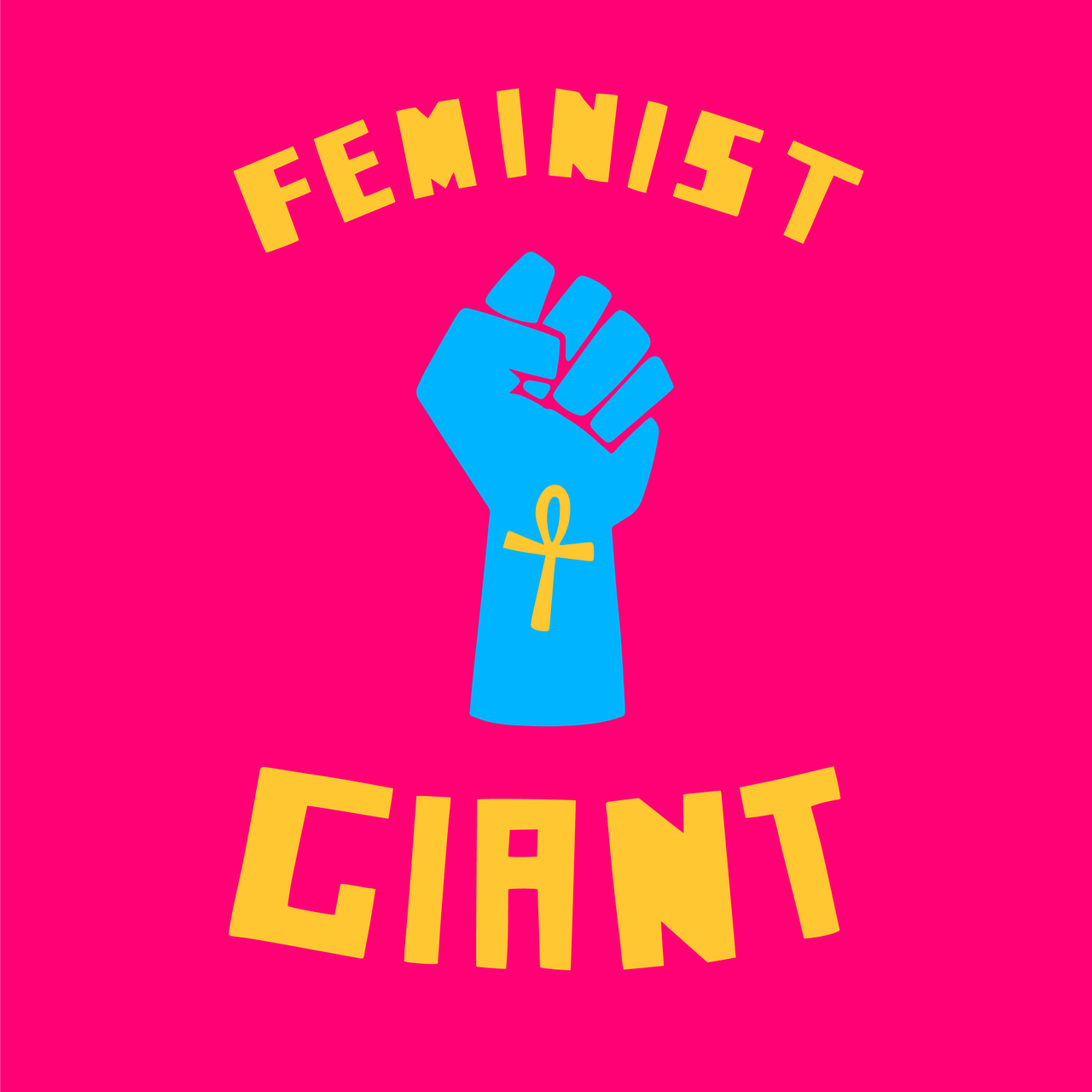Global Roundup: Pakistan Trans Women Protest, Poland Abortion Activist Faces Trial, LGBTQ People Leaving Hungary, Women vs Morality Police in Iran, Breaking Barriers for Muslim Women in Sports
Curated by FG contributor Samiha Hossain
Gudiya, 23, holds a poster at the recent vigil. Photograph: Shah Meer/The Guardian
CW: transphobia
A rally and vigil were held for the trans community – known as khawaja sira – in Pakistan’s capital, Islamabad, last week to protest recent killings. Last month, news of trans women being murdered in their homes and on the streets made headlines. Five were killed and eight injured in attacks across Khyber Pakhtunkhwa, a province bordering Afghanistan.
When Mano went to meet her boyfriend Sanaullah at a printing press to get back some money he had borrowed, he refused to pay. She insisted and refused to leave without the money and he shot her. Mano’s family refused to bury her, so the khawaja sira took her body and gave her a funeral.
We keep fighting a battle from our births till our deaths. Even after death we are not accepted by our families. What can be a bigger tragedy than this? - Farzana Riaz, Mano’s friend
Transgender people were legally recognized as “the third gender” through a supreme court ruling in Pakistan in 2012. Furthermore, in 2018 Pakistan passed legislation guaranteeing basic rights for transgender citizens and outlawing discrimination. But discrimination is widespread and “honour” killings, rape, blackmail, sexual harassment, attacks, chopping off hair – are common crimes against the khawaja sira community. According to Trans-Action Alliance, since 2015, 91 transgender women were killed in the province and there are 2,000 registered cases of violence against the transgender community in Khyber Pakhtunkhwa alone.
Gudiya, 23, who came to the vigil to protest against the rise in violence, said the community is excluded from education and therefore has few options for work other than begging, dancing and sex work.
If we had opportunities and alternatives, we would not have opted [for] these options, and the irony is that these very reasons are then used to humiliate and murder us. - Gudiya
Nayyab Ali, the executive director of Transgender Rights Consultants in Pakistan, says transphobia and hate crimes are clear reasons behind the recent surge of violence against the community. She says that violent incidents are not reported and if they are, the police do not take them seriously. Professor Farzana Bari attended the rally to show solidarity with the khawaja sira community.
The community is organized now and a leadership is emerging and they raise [their] voice for their community’s rights and against violence. But we, (cis) women and (cis men, have to stand by them as allies. - Professor Farzana Bari
Wydrzyńska could be imprisoned for a maximum of three years if found guilty [Courtesy of Grzegorz Zukowski] via Al Jazeera
Justyna Wydrzyńska, 47, who has been helping women access abortion for more than 15 years, is set to face trial in Poland this week for violating the country’s strict abortion law. She could be imprisoned for a maximum of three years if found guilty of providing abortion-inducing tablets to a pregnant woman.
Wydrzyńska is the founder of Poland’s first chatroom for exchanging abortion-related information and co-founder of pro-choice advocacy organisation Abortion Dream Team (ADT). In February 2020, she was contacted by a woman who was 12 weeks pregnant and living under domestic violence. The woman wanted an abortion, but was unable to travel because of her violent husband. Wydrzyńska was touched by the woman’s story as she had a similar experience in 2006, so she took the risk and sent abortion pills via the Polish post. Police turned up at the woman’s home the day the package of pills, which also contained Wydrzyńska’s contact details, arrived. She miscarried from stress.
Of course, I helped her; I wouldn’t be a human if I hadn’t. - Justyna Wydrzyńska
On April 8, Wydrzyńska is to stand trial for assistance in terminating the pregnancy, by which she violated Article 152.2 of the Polish Penal Code. If convicted, she faces up to three years in prison. She is also charged with the possession of unauthorized drugs with the aim of introducing them to the market.
Since January 2021, Poland has tightened its already strict anti-abortion laws, which has led to at least two women’s death. Having an abortion is not a criminal act in itself, but helping someone perform an abortion can be criminalized according to Katarzyna Szwed, a member of Wydrzyńska’s legal team. The criminal code, which regulates abortion aid, states that it is illegal to help someone perform an abortion without explaining what is meant by aid.
You have a state that says: Yes, you may have an abortion, but we will not give you information on how to get it, and we will tell everyone around you that it is a criminal offence to help you. This creates an immense chilling effect: anyone who helps you could technically end up in court. - Katarzyna Szwed
Netherlands-based pro-choice activist Kinga Jelińska, believes the Polish state has failed to deliver basic reproductive care and hence activist and feminist groups have to do the work. She views the charges against Wydrzyńska as contradictory to international recommendations. Another abortion activist and doula, Agata Adamczuk, believes that Wydrzyńska’s case will strengthen the pro-choice movement in Poland.
We will work harder, bolder and louder. I see tremendous solidarity and sisterhood that exploded inside the movement after learning about Wydrzyńska’s case. We are so incredibly angry at the Polish government for harassing activists and women in general. - Agata Adamczuk
LUCA DUDITS (CENTRE) AND OTHER ACTIVISTS FROM THE HÁTTÉR SOCIETY, HUNGARY’S BIGGEST AND OLDEST LGBTQ ORGANISATION. PHOTO: MIKHAIL GALUSTOV via VICE
Some LGBTQ people are moving from Hungary due to the election last weekend that included a referendum on LGBTQ rights in Hungary. The country’s nationalist Prime Minister Viktor Orbán scored a fourth consecutive landslide win in Sunday's election. The election was held on the same day as a referendum on a law passed last year that prohibits teaching LGBTQ topics in school. Less than half of eligible voters cast valid ballots, rendering the vote non-binding, though more than 90% voted in line with the government’s campaign. However, Orbán has previously portrayed non-binding referendum outcomes as victories, and his officials said it would be no different this time.
Orbán’s government has already outlawed gay marriage, labelled gay men pedophiles, and banned trans people from legally changing their gender. LGBTQ people are attacked in the streets, and Hungarian police take no action. The new anti-LGBTQ education law is so vague, TV channels worry it could limit them showing popular movies and shows. In other ways, the impacts are already evident: a parliament member recently shredded a children’s book featuring diverse fairytales and gay princes. Orbán also found time to hate on it.
The writer of the book, Boldizsar Nagy, is planning on leaving the country. It sold out in its first week, but book readings were canceled after right-wing protests, and the publishers received death threats.
We started to think about moving when the new LGBTQ laws came out. And since the book has been published and all of these scandals around it, there are just more anti-LGBTQ laws, so, we are stronger than before in our decision that it's not our place. - Boldizsar Nagy
Luca Dudits is trying to do something about the negativity queer people face in Hungary. She is the leader of the Háttér Society, Hungary’s biggest and oldest LGBTQ organization. Dudits thinks the referendum being on the same day as the general election is a way to get more people out to vote.
In Hungary, LGBTQ people are unfortunately very much discriminated against in their everyday lives… So these assaults do happen. And unfortunately, since the anti-LGBTQ legislations have started, they have become more and more regular because I think that this very homophobic and transphobic minority feels very much encouraged by the government's propaganda. - Luca Dudits
With Orbán’s government still in power, the LGBTQ community is left feeling unsafe and in fear of the situation worsening. It is especially troubling for those that are unable to move or do not wish to leave their home.
Two Iranian women in northern Tehran on Mar. 20, 2022. (Morteza Nikoubazl / NurPhoto via Getty Images) via Ms Magazine
When she was 16, Mahmoudi was stopped and arrested by two morality guards who loaded her into their car, and took her to the local station for having her hair uncovered. After being humiliated and reprimanded for hours, she was forced to sign a confession and released on the terms of being punished with 50 lashes in public if she reoffended.
To this day, I remember the searing mix of emotions that is familiar to millions of Iranian women who are arrested every year for this “offense.” First there was fear and anxiety, then shame and desperation, and finally righteous anger. - Firuzeh Mahmoudi
Today, Mahmoudi is awed by how Iranian women are “actively resisting [the] male ideal of womanhood.” A womanhood that is defined by silence, self-sacrifices and subservience to men.
Through social media, mobile apps, weblogs and websites, Iranian women are actively participating in public discourse and exercising their civil rights, mostly anonymously. Luckily for the growing women’s rights movement, the patriarchal and misogynistic government has not yet figured out how to completely censor and control the internet. - Firuzeh Mahmoudi
For example, a movement of women is challenging existing laws that allow parents to marry off daughters as young as 9 years old. They are publicly sharing past generations’ heartbreaking stories of child abuse and demanding legal protections for children and changes in policy. Social media movements like “My Stealthy Freedom,” “White Wednesdays” have also made the resistance against the morality police visible online.
But women are not only using technology, they are now creating technology that allows them to protest, organize and empower other women. Mahmoudi’s organization, United for Iran, created Cheragh Academy, an educational platform and social media campaign that teaches Iranians how to recognize sexual harassment in the workplace and safely challenge it. They also worked with women’s rights and LGBTQI+ activists to create Hamdam – an app that disguises itself as a period tracker app but actually demystifies complex Iranian laws. The app was so popular among women that the Iranian clergymen launched a counter-app with the same name, but with a goal of advertising traditional Islamic marriage between men and women and increasing the Iranian natality rate. Mahmoudi’s team also produced an app called Gershad to help millions of women who are harassed by the morality police every year. Users can securely view and report to each other in real-time the location of the morality police checkpoints.
Mahmoudi recognizes that she might not be able to pass laws to remove the oppressive morality police. However, she can create apps to empower Iranians to avoid them and hopefully make their job obsolete.
Today, when I look at my 16-year-old self, sitting alone and terrified in that station, I am proud to tell her: “My dear, you are not alone. You are part of a powerful and growing movement and we won’t stop until we change Iran for the better.” - Firuzeh Mahmoudi
Image via Complex
Fitriya Mohamed is an African Muslim based in Toronto, Canada, who wants to create space for Muslim women in sports. Mohamed is a basketball player, organizer and academic in her community. She believes in the importance of representation in cultivating young girls’ self-esteem and goals.
Mohamed is an ambassador for the Hijabi Ballers, a project that “..seeks to recognize and celebrate the athleticism of Muslim girls and women…we also work to increase participation, and consequently representation, of Muslim females in sport spaces and sports programs around the city.” She is also a Master’s student focused on creating space for Muslim women in academia.
I think this is the exact kind of representation we need. Especially in a time where [Muslim women] are being challenged for wearing the hijab in many parts of the world. - Fitriya Mohamed
Mohamed wants to look beyond the Western world and also understand what keeps Muslim women athletes excluded in the Global South. She hopes to use this knowledge for her passion project The Muslim Women Summer Basketball League. The league has been delayed due to the provincial restrictions imposed by the pandemic, but Mohamed expects to see it through soon.
…We’ve been using social media to actually share stories of women hooping around the globe. I think it goes back to my initial issue of not realizing that there are other Muslim women out there who are playing basketball and who are doing amazing things in their communities. - Fitriya Mohamed
Samiha Hossain (she/her) is a student at the University of Ottawa. She has experience working with survivors of sexual violence in her community, as well as conducting research on gender-based violence. A lot of her time is spent learning about and critically engaging with intersectional feminism, transformative justice and disability justice.
Samiha firmly believes in the power of connecting with people and listening to their stories to create solidarity and heal as a community. She refuses to let anyone thwart her imagination when it comes to envisioning a radically different future full of care webs, nurturance and collective liberation.







